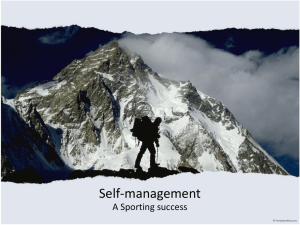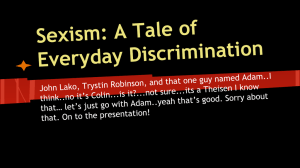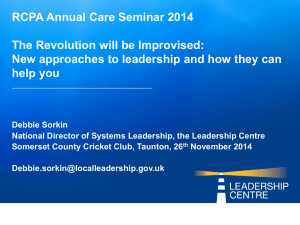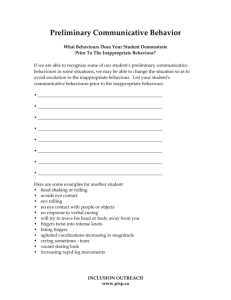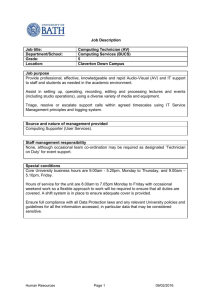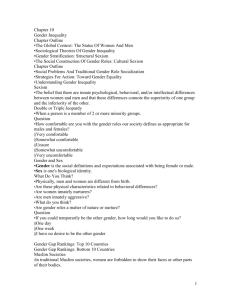Challenge Sexism and Lad Culture
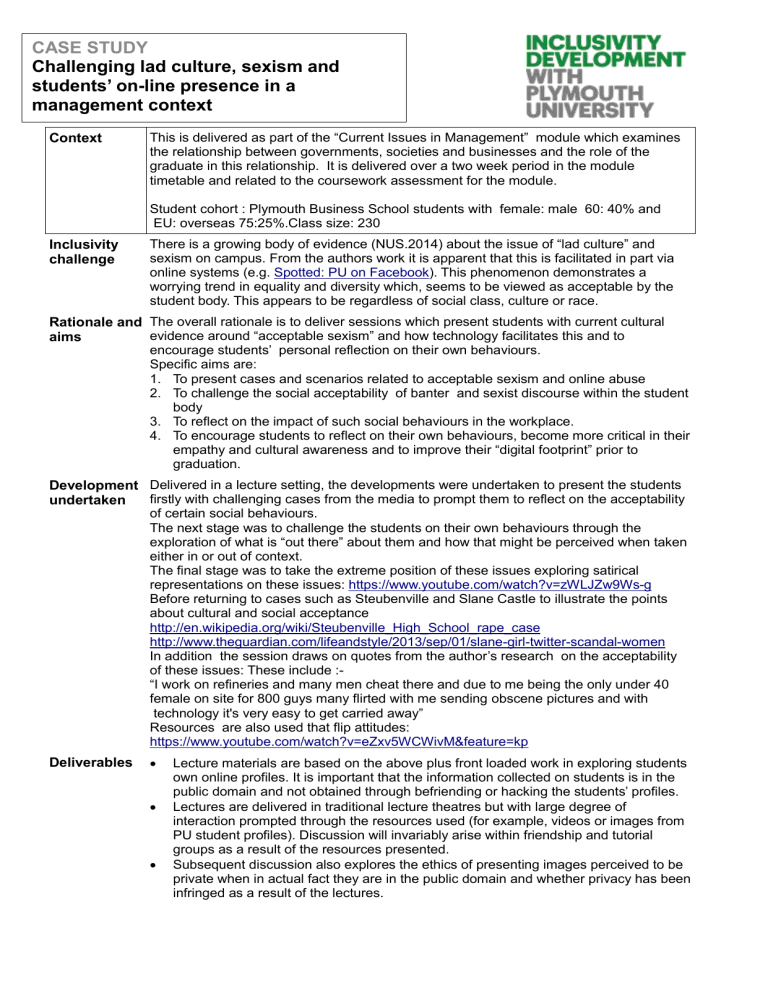
CASE STUDY
Challenging lad culture, sexism and students’ on-line presence in a management context
Context
Inclusivity challenge
This is delivered as part of the “Current Issues in Management” module which examines the relationship between governments, societies and businesses and the role of the graduate in this relationship. It is delivered over a two week period in the module timetable and related to the coursework assessment for the module.
Student cohort : Plymouth Business School students with female: male 60: 40% and
EU: overseas 75:25%.Class size: 230
There is a growing body of evidence (NUS.
2014) about the issue of “lad culture” and sexism on campus. From the authors work it is apparent that this is facilitated in part via online systems (e.g. Spotted: PU on Facebook ). This phenomenon demonstrates a worrying trend in equality and diversity which, seems to be viewed as acceptable by the student body. This appears to be regardless of social class, culture or race.
Rationale and aims
The overall rationale is to deliver sessions which present students with current cultural evidence around “acceptable sexism” and how technology facilitates this and to encourage students’ personal reflection on their own behaviours.
Specific aims are:
1. To present cases and scenarios related to acceptable sexism and online abuse
2. To challenge the social acceptability of banter and sexist discourse within the student body
3. To reflect on the impact of such social behaviours in the workplace.
4. To encourage students to reflect on their own behaviours, become more critical in their empathy and cultural awareness and to improve their “digital footprint” prior to graduation.
Development undertaken
Deliverables
Delivered in a lecture setting, the developments were undertaken to present the students firstly with challenging cases from the media to prompt them to reflect on the acceptability of certain social behaviours.
The next stage was to challenge the students on their own behaviours through the exploration of what is “out there” about them and how that might be perceived when taken either in or out of context.
The final stage was to take the extreme position of these issues exploring satirical representations on these issues: https://www.youtube.com/watch?v=zWLJZw9Ws-g
Before returning to cases such as Steubenville and Slane Castle to illustrate the points about cultural and social acceptance http://en.wikipedia.org/wiki/Steubenville_High_School_rape_case http://www.theguardian.com/lifeandstyle/2013/sep/01/slane-girl-twitter-scandal-women
In addition the session draws on quotes from the author’s research on the acceptability of these issues: These include :-
“I work on refineries and many men cheat there and due to me being the only under 40 female on site for 800 guys many flirted with me sending obscene pictures and with
technology it's very easy to get carried away”
Resources are also used that flip attitudes: https://www.youtube.com/watch?v=eZxv5WCWivM&feature=kp
Lecture materials are based on the above plus front loaded work in exploring students own online profiles. It is important that the information collected on students is in the public domain and not obtained through befriending or hacking the students’ profiles.
Lectures are delivered in traditional lecture theatres but with large degree of interaction prompted through the resources used (for example, videos or images from
PU student profiles). Discussion will invariably arise within friendship and tutorial groups as a result of the resources presented.
Subsequent discussion also explores the ethics of presenting images perceived to be private when in actual fact they are in the public domain and whether privacy has been infringed as a result of the lectures.
10mins
The delivery structure of a session :
D iscussion on media stories of extreme cases of “digital stupidity” – how people have
15mins
15mins
15mins
done daft things online and how this has affected them from employability and legal perspectives. Reflections and examples from students
Exploring students own digital behaviours through materials drawing from social media being careful to provoke thought not humiliate or embarrass. Reflection from the group about how they feel about privacy issues, etc.
Exploring the legalities and rights on the part of employers and employees, defining the concept of digital risk and employer responses
Extending the concept of digital risk to explore issues of sexism, abuse etc., the difference between banter and bullying, workplace protection from these sorts of
5mins
issues, etc. Reflections and group discussions.
Conclusions and final remarks
Benefits and impact
Lessons learned
The key benefit of the sessions arises from the student engagement with the topic and discussion which challenges their beliefs on what is acceptable in an Equality & Diversity content.
The impact of seeing their own (generally embarrassing) photographs shown on a large screen in a lecture generally challenges their perception on what is public and what is private. In addition, the extreme cases explored allow students to reflect on their initial and subsequent attitudes toward what is being presented to them.
Student comments included:
“No-one has ever discussed it in those terms before”
“That was really scary, I’m changing my privacy settings”
“It’s made me think about what I viewed as banter”
A large cohort does not mean the lecture setting has to be dry, passive and
“academic” One of the key considerations with this type of approach is it cannot be delivered at the start of a module – one has to have the trust of the students before embarking on this journey.
It is also important that the staff member is open and approachable and not judgemental to the students.
There are planned follow up sessions and again the staff member has to respond to these issues in a sensitive manner.
Further opportunities
This case, while delivered in this instance in a management context, has relevant across the professions. Similar sessions have been run with trainee teachers and social workers who need to reflect on their own behaviour whilst also thinking about how these issues might manifest in their future careers and for people in their care. Therefore they have to separate their professional opinions from their personal behaviour before considering whether one biases the other.
The sessions have been used with Law students, who will generally take the objective, legal, perspective, without considering the greyer ethical areas. It allows them reflect on the speed with which digital behaviour evolves and the issues in “keeping up” within their profession.
For subjects with less of a direct alignment to a profession this topic is equally applicable as these issues are not subject or profession specific.
In terms of recommendations for taking things forward:
1. Students are very engaged with these issues is addressed in an inclusive, non confrontational, manner which allow time for reflection
2. Be careful not to paint males as “the bad guys” as a starting point. While the majority of abuse might be male oriented it is not exclusive and we also need to consider why these behaviours emerge
3. This should be tied back into employability and personal development. Equality &
Diversity can be viewed as something disconnected from “the day job” but discussions in these sessions were grounded in the personal, rather than policy.
4. This is not subject specific – all students have a social life regardless of discipline and all wish to gain employment at the end of their degree. These are the hooks to hang these concepts from.
Contact
Professor Andy Phippen. andy.phippen@plymouth .ac.uk
Inclusivity Development
Learning Support and Wellbeing
Roland Levinsky Building
T 01752 587676
T 01752 587676
E lsw@plymouth.ac.uk
E lsw@plymouth.ac.uk
